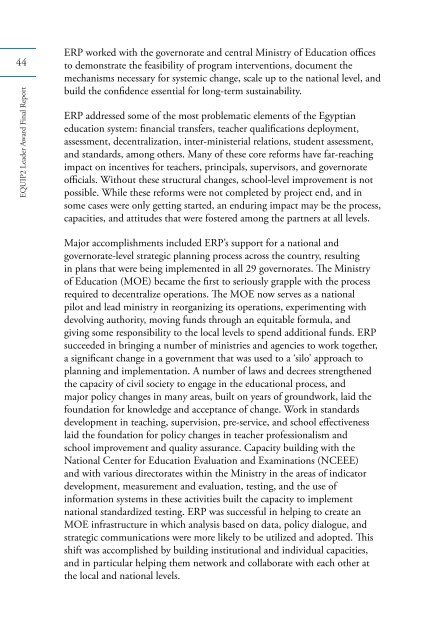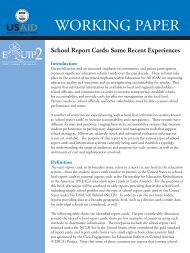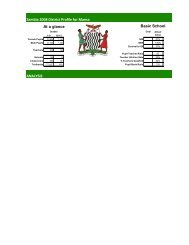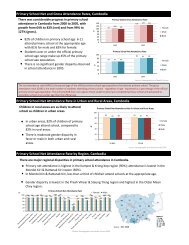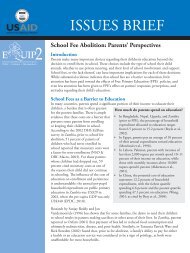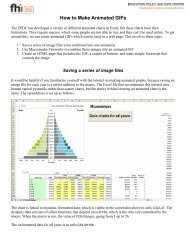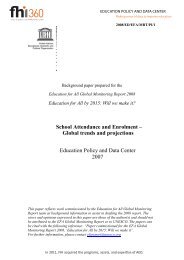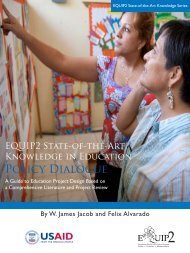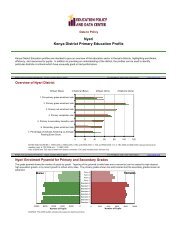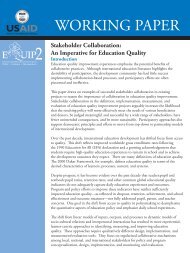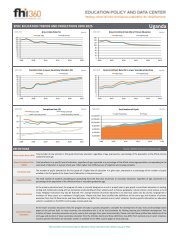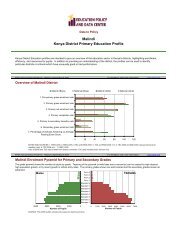EQUIP2 Final Report.pdf - Education Policy Data Center
EQUIP2 Final Report.pdf - Education Policy Data Center
EQUIP2 Final Report.pdf - Education Policy Data Center
Create successful ePaper yourself
Turn your PDF publications into a flip-book with our unique Google optimized e-Paper software.
44<br />
<strong>EQUIP2</strong> Leader Award <strong>Final</strong> <strong>Report</strong><br />
ERP worked with the governorate and central Ministry of <strong>Education</strong> offices<br />
to demonstrate the feasibility of program interventions, document the<br />
mechanisms necessary for systemic change, scale up to the national level, and<br />
build the confidence essential for long-term sustainability.<br />
ERP addressed some of the most problematic elements of the Egyptian<br />
education system: financial transfers, teacher qualifications deployment,<br />
assessment, decentralization, inter-ministerial relations, student assessment,<br />
and standards, among others. Many of these core reforms have far-reaching<br />
impact on incentives for teachers, principals, supervisors, and governorate<br />
officials. Without these structural changes, school-level improvement is not<br />
possible. While these reforms were not completed by project end, and in<br />
some cases were only getting started, an enduring impact may be the process,<br />
capacities, and attitudes that were fostered among the partners at all levels.<br />
Major accomplishments included ERP’s support for a national and<br />
governorate-level strategic planning process across the country, resulting<br />
in plans that were being implemented in all 29 governorates. The Ministry<br />
of <strong>Education</strong> (MOE) became the first to seriously grapple with the process<br />
required to decentralize operations. The MOE now serves as a national<br />
pilot and lead ministry in reorganizing its operations, experimenting with<br />
devolving authority, moving funds through an equitable formula, and<br />
giving some responsibility to the local levels to spend additional funds. ERP<br />
succeeded in bringing a number of ministries and agencies to work together,<br />
a significant change in a government that was used to a ‘silo’ approach to<br />
planning and implementation. A number of laws and decrees strengthened<br />
the capacity of civil society to engage in the educational process, and<br />
major policy changes in many areas, built on years of groundwork, laid the<br />
foundation for knowledge and acceptance of change. Work in standards<br />
development in teaching, supervision, pre-service, and school effectiveness<br />
laid the foundation for policy changes in teacher professionalism and<br />
school improvement and quality assurance. Capacity building with the<br />
National <strong>Center</strong> for <strong>Education</strong> Evaluation and Examinations (NCEEE)<br />
and with various directorates within the Ministry in the areas of indicator<br />
development, measurement and evaluation, testing, and the use of<br />
information systems in these activities built the capacity to implement<br />
national standardized testing. ERP was successful in helping to create an<br />
MOE infrastructure in which analysis based on data, policy dialogue, and<br />
strategic communications were more likely to be utilized and adopted. This<br />
shift was accomplished by building institutional and individual capacities,<br />
and in particular helping them network and collaborate with each other at<br />
the local and national levels.


